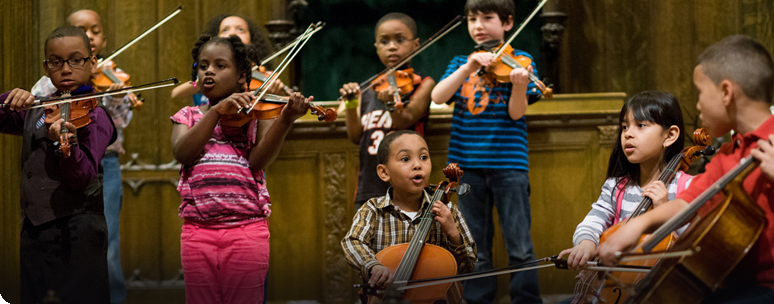Teaching MomentsOne of the great (and sometimes terrifying and intense) things about the Daily Orchestra Program is that we see and work with the same students every day of the week! This means that student transformations can sometimes happen over a surprisingly short period of time. Often I am so engrossed in each moment that I forget to see this big picture. Just like when I’m at home staring into the mirror and seeing all my flaws, in my teaching I am easily caught up in the details I want to improve – the lessons that don’t go according to plan, the student who still has trouble keeping his viola’s scroll up, the orchestra’s responsiveness to instructions, and of course my own teaching’s effectiveness and flow. Every now and then moments occur that do make me step back and remember the whole. Some of those moments are the obvious ones, like the performance party back in January, but more often than not they are private, witnessed by only a few (well, maybe thirty max). Today I had one of those moments when I was faced with the task of calming a student down who had become so angry he had run away right before orchestra and disappeared for several minutes. When he resurfaced (as if by magic after my frantic and unsuccessful search) he seemed on the verge of breaking something. I learned later that another student had kicked him by accident. I listened to his story and said I could understand why he was feeling angry. But then I asked him calmly whether in that moment it was more important to sit there and feel angry or whether participating in music was more important. He answered softly and immediately: “music.” Something changed. He became a calmer, more collected and purposeful student than the one who ran away from me only moments ago. By realizing he wanted to play music that day he was able to if not forget his anger, at least put it aside for the duration of orchestra. One of the most difficult tasks we face as human beings is having to deal with our emotions. I notice children struggle with this, especially when those feelings are scary, like sadness or anger (heck, I still struggle with those!). Adrienne and I both share the vision that in our Daily Orchestra Program we are not just teaching students to play string instruments, we are teaching them to be kind, compassionate, healthy, and happy human beings. Helping our students to handle their emotions is part of that vision, and even though my moment alone with an angry young boy didn’t involve teaching him to play music (there wasn’t even an instrument in the room), it somehow felt like a small success. Whether in the future he’ll be able to draw anything from that one moment in time I don’t know. My hope is that he will, but if he doesn’t. . . well, we’ll be seeing him again tomorrow. Each day presents opportunities to guide our students through that harrowing and beautiful landscape of human emotion. Luckily for us, all of music could be seen as humanity’s way of dealing with its feelings, so we’ve chosen our vehicle well. -Lisa Barksdale, Associate Resident Musician, the Daily Orchestra Program |
